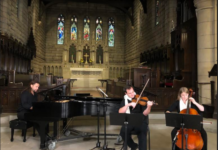Wichita State University professors Jibo He and Barbara Chaparro continue to find ways to be creative and innovative — this time inventing a device that could have positive ramifications in the medical field and beyond.
Their latest invention, developed with the help of WSU grad student Long Wang, is called Google Lens.
The device is an accessory lens that attaches to Google Glass, which is a wearable product that uses voice control so users can check information easily while keeping their hands busy. Information can be displayed in Google Glass’ see-through head-mounted display, and its built-in camera allows convenient video sharing and remote conference.
But the view users have with Google Glass has one drawback, He says. Its webcam has a narrow visual field of 54.8 degrees horizontally and 42.5 degrees vertically. The narrow field of view limits Google Glass’ usefulness for some applications.
Enter Google Lens, which expands the device’s view by 58 percent horizontally (to 109.8 degrees) and 34 percent vertically (to 57.8 degrees).
Why is it important to expand Google Glass’ view?
Professionals are starting to use Google Glass, for everything from surgery and medical training to usability research and even flying a plane. Several hospitals, including Wesley Medical Center in Wichita and the renowned Brigham & Women’s Hospital in Boston, are building Google Glass applications to improve their medical services, surgery and new doctor training.
“The object they want to broadcast may be out of the field of view of Google Glass,” He says. “Despite all of its remarkable features, Google Glass has some limitations in its hardware.”
Google Lens, he says, solves that problem.
It includes a holder to attach the lens to the frame of Google Glass. The lens that is fitted into the accessory can be changed easily.
“The accessory lens helps remedy the bottleneck of Google Glass’ camera and improves and expand Google Glass’ application in professional areas,” He says.
He and Chaparro have applied for a U.S. patent for Google Lens and are awaiting approval.




